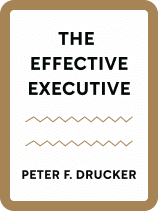

This article is an excerpt from the Shortform book guide to "The Effective Executive" by Peter F. Drucker. Shortform has the world's best summaries and analyses of books you should be reading.
Like this article? Sign up for a free trial here .
Are we living in the age of a knowledge worker? What type of work is considered “knowledge work”?
Knowledge workers as those who use the knowledge acquired through formal education to produce results—in other words, people who think for a living. According to Peter Drucker, knowledge workers are, in effect, executives because, whether or not they supervise others, they make the same types of decisions as managers as opposed to following orders.
Read about the rise of the knowledge worker and its implications for the economy at large.
The Age of the Knowledge Worker
According to Peter Drucker, knowledge workers include professionals, scientists, educators, analysts, system designers, software developers, health care workers, engineers, and other white-collar workers. These workers find and analyze information and apply it to solve problems, generate ideas, or create new products and services.
Previously, manual or blue-collar work predominated. Manual workers only needed to do things efficiently and as directed. Productivity meant producing a quantity of something—effectiveness wasn’t needed. (Shortform note: In 1920, manual workers outnumbered knowledge workers 2-1 but by 1980, the situation had completely reversed; 1956, around the time Drucker began writing about the shift, was the point at which white-collar workers first outnumbered blue-collar workers.)
In contrast to manual workers, Peter Drucker realized that for the knowledge worker, productivity requires effectiveness. They must apply and share information effectively. Rather than being told what to do, knowledge workers determine and contribute information and ideas important to the organization’s performance (what Drucker refers to as “the right things”).
Drucker realized the economic shift had implications for the way organizations were structured and managed. Knowledge work requires a decentralized, collaborative environment where employees exercise initiative and, for effectiveness, must think and manage themselves, communicate their information in a useful form to the people who need it, and learn continuously. (Shortform note: Part of creating an environment where knowledge workers can succeed is acknowledging and treating them as experts.)
| Knowledge Workers Today Knowledge work continues to be the world’s fastest-growing employment sector, according to the Reference for Business. The Wall Street Journal reported in 2016 that in the U.S., jobs in knowledge work were growing by about 1.9 million a year, more than any other type of job since the 1980s. By another estimate, the world surpassed 1 billion knowledge workers in 2019. Forbes declared 2020, a year in which the Covid-19 pandemic forced a global shift to remote work, the year of the knowledge worker. In the future, a combination of factors, including the retirement of the baby boom generation, lack of access to college by blue-collar workers, and the continually expanding knowledge economy, may create a shortage of knowledge workers. To fill positions, businesses will need to offer competitive salaries and benefits, flexibility, autonomy, growth opportunities, and an attractive work environment. To get jobs, employees will need to show motivation, creativity, interpersonal skills, and continuous learning, besides having the right knowledge base. However, a Harvard Business Review article argues that businesses should consider all of their employees to be knowledge workers—including those engaged in seemingly routine tasks. As companies move from an efficiency to an effectiveness mindset to innovate and address constant disruption, encouraging everyone to be a problem-solver will be a key to improving company performance. |

———End of Preview———
Like what you just read? Read the rest of the world's best book summary and analysis of Peter F. Drucker's "The Effective Executive" at Shortform .
Here's what you'll find in our full The Effective Executive summary :
- How to manage yourself before you can manage others
- The five practices that anyone can learn to be more effective
- Why leaders should purposely create disagreements






